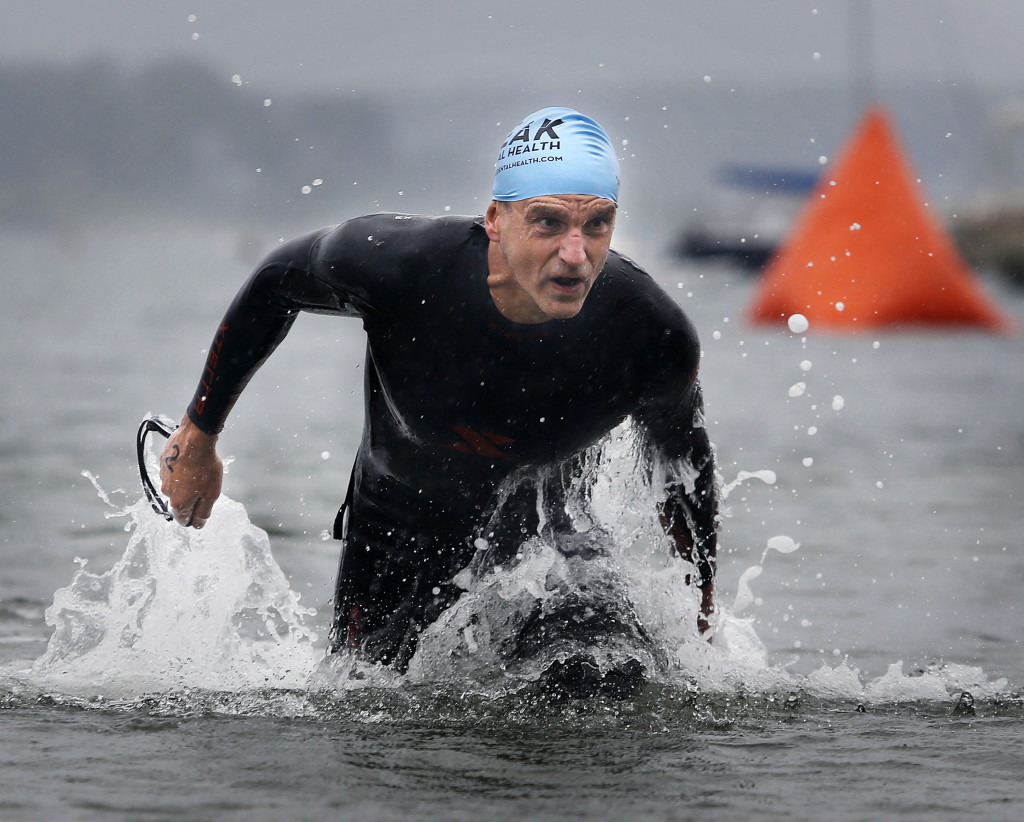Contributed by Charlotte Brynn, NE LMSC Open Water Sanctions Chair
Event: Peaks to Portland Swim to Benefit Kids
Date: July 28, 2018
Distance 2.4 miles
Location: Casco Bay, Maine
Maine is right up there on my list of favorite places to swim. It has a lot to do with the vastness of the ocean, the variety of rugged coastline and sandy beaches, and the vibrant, friendly open water swimming community. Traveling to an open water swim event is a great way to experience another area, meet new people and discover new places to swim.
I was impressed to learn that the long running Peaks to Portland swim had a swimmer who has participated for 30 years! I wanted to learn more about the draw of this long running event and what keeps people coming back. Sarah Leighton, from the YMCA of Southern Maine, filled me in on all the things that make this swim so special and a must for your open water calendar!
Charlotte Brynn: Peaks to Portland is a 2.4 mile swim that has a wealth of history dating back to before WWII. Tell us about some of the early swims.
Sarah Leighton: Peaks to Portland started in the 1920s. At that time, there were no wetsuits so swimmers would grease their bodies in an effort to keep warm. Back then, the fastest swimmers finished the swim in one hour and fifteen minutes. Today swimmers finish in as little as 40 minutes. The swim was suspended at the start of World War II due to the fear of mines in the water. It wasn’t until 1981 that it was revived by the YMCA of Southern Maine, and we’ve hosted the event ever since.
CB: The Maine coastline is famous for its rugged good looks, and Maine swimmers are some of the most welcoming swimmers I’ve encountered around the world. What are some of the highlights of the swim that help make it an OW event not to miss?
SL: There’s no better way to experience Maine than the Peaks to Portland Swim. Swimmers take the Casco Bay Ferry in the early morning to picturesque Peaks Island where they begin their journey. Together with 500 other swimmers, they swim with the tide across Casco Bay. They pass the historic Fort Gorges, built in the 1850s. And at East End Beach, thousands of cheering spectators and volunteers welcome them across the finish line.
CB: You provide terrific support to swimmers before, during and after the swim, from training support, to what to bring and wear to park. What tips can you share for a swimmer new to Peaks to Portland?
SL: When it’s cold, swimmers are forced to train in a pool, but it’s important that they transition their training to the ocean at least a couple weeks prior to the event. This helps swimmers acclimate to the cold water and reduces their chance of developing hypothermia on race day. Veteran swimmers also encourage new participants to practice in their wetsuits and with their kayaker (even if it’s in fresh water). That way, you’re used to the extra buoyancy provided by your suit and you and your kayaker have a chance to develop a good communication system. If you’re looking for additional support, consider signing up for one of the YMCA of Southern Maine’s Peaks to Portland training classes!
CB: Finally, please tell us about some of the inspirational swimmers that swim Peaks to Portland.
SL: The Peaks to Portland Swim attracts a diverse group of swimmers. Last year, our oldest swimmer was 74 years old, and our youngest was 16. We welcome swimmers of all types as long as they’re able to swim one mile in 40 minutes or less. Last year, swimmer Merry Farnum completed her 30th Peaks to Portland Swim! In fact, she completed all 30 swims without a wet suit – now that’s tough! As an advocate for the YMCA of Southern Maine, she also raised over $3,000 to benefit youth. Fundraising is an important part of this race – last year we raised over $180,000 all of which went to supporting kids in our youth development programs.
CB: Thanks Sarah, all the best another successful event this year!


